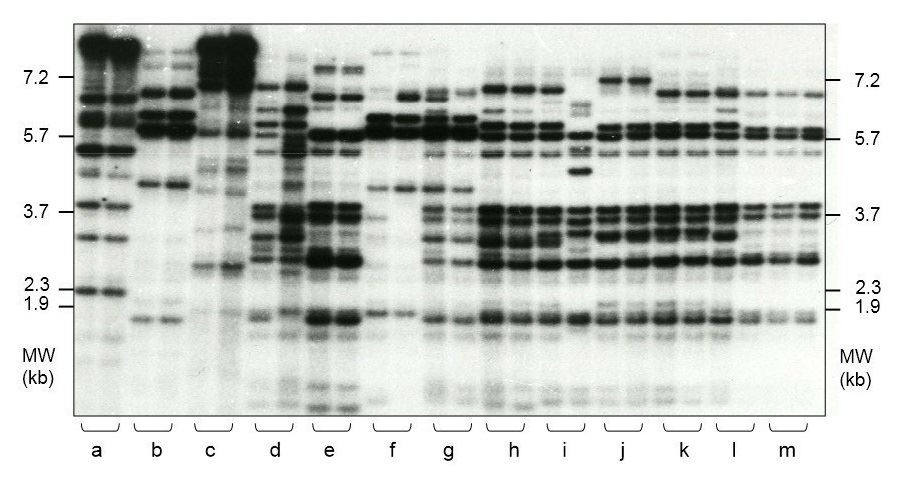Fingerprinting and Trait Analysis Service for Tissue Culture Plants
DNA fingerprinting is a method of distinguishing between groups of organisms or individuals by using DNA sequences that are highly variable in the organism (but stably inherited within the group or individual). Lifeasible provides you with fingerprinting services for tissue culture plant samples and associated trait analysis. It helps you to make fast and accurate identification of varieties and strains.
What is Fingerprinting
With the development of molecular biology, the types of markers used for DNA fingerprinting have been constantly updated. From the traditional restriction fragment length polymorphism (RFLP), random amplification polymorphism DNA (RAPD), and amplified fragment length polymorphism (AFLP) markers to simple sequence repeat (SSR), the more widely used single nucleotide polymorphism (SNP) markers. Traditional markers have the disadvantages of low polymorphism and sensitivity to mutation. In contrast, SNP markers, as the third generation of molecular markers, have the advantages of large numbers, wide distribution, dimorphism, and easy high-throughput detection.
 Figure 1. Hybridization-based restriction fragment length polymorphism fingerprints of tomato plants (Solanum lycopersicum). (Nybom, H., et al, 2014)
Figure 1. Hybridization-based restriction fragment length polymorphism fingerprints of tomato plants (Solanum lycopersicum). (Nybom, H., et al, 2014)
SNP marker development technologies include resequencing technology, microarray, simplified genome technology, etc. Simplified genome technology is not dependent on the reference genome, does not require customization, and can detect new loci widely used in SNP development.
What We Offer
We provide DNA fingerprinting technology for rapid and accurate identification of varieties through screening and identification of tissue culture plant samples. We provide SNP fingerprinting, 2D barcoding, and genetic analysis to support the screening and identification of high-quality tissue-cultured plant germplasm, mining of important genes, and broadening the molecular level of genetic and subsequent breeding work. It can be applied to the diversity and purity identification studies of varietal resources of many tissue-cultured plants.
- SNP filtering is performed based on indicators such as sequencing depth, data quality, uniformity of locus distribution, allele frequency, and locus chain relationship. Finally, high-quality, independent SNPs were obtained for the construction of DNA fingerprinting.
- Based on the pre-SNP loci filtering and screening, SNP markers that can be constructed for fingerprinting, genetic diversity, and genetic structure were evaluated. The final SNP markers obtained can distinguish different materials, construct DNA fingerprints, and draw the QR code of fingerprints.
- Correlative trait analysis based on the results of DNA fingerprint construction.
Applications
- Early identification of seedlings. It can be used to identify purity and authenticity indicators to better assess tissue culture plants' quality.
- Variety selection. It can be used for the identification of good varieties.
- Variety differentiation and naming. For further conservation and systematic naming of plant germplasm resources, as well as distinguishing them from artificially grown varieties, to support the conservation of plant germplasm resources.
Advantages
- High accuracy
- High site adaptability
- Suitable for testing large numbers of samples
- Low cost
From a molecular biology point of view, there are stable and heritable differences between groups of organisms or individuals, and the essence of these differences is differences in DNA sequences. Lifeasible provides fingerprinting and trait analysis services for tissue culture plant samples; please feel free to contact us for a proposal.
Reference
-
Nybom, H., et al. (2014). "DNA fingerprinting in botany: past, present, future." Investig Genet 5:1(2014).
You want to sign a confidentiality agreement.
You have a specific plant species for your experimental needs.
You have a reliable and relevant cooperation project to discuss.
You are very interested in our project or have any questions.
You need an updated and detailed quotation.
For research or industrial use.

 Figure 1. Hybridization-based restriction fragment length polymorphism fingerprints of tomato plants (Solanum lycopersicum). (Nybom, H., et al, 2014)
Figure 1. Hybridization-based restriction fragment length polymorphism fingerprints of tomato plants (Solanum lycopersicum). (Nybom, H., et al, 2014)
